Posted by Elena del Valle on February 8, 2019

D-CYPL For the Cause
Photos, song: Greg L.Hines, D-CYPL
Hip hop artist D-CYPL released For the Cause, his first mini albums, in January 2019. Scroll down to listen to a song from the album.
Christopher Collins, known in hip hop circles as D-CYPL, was born in Livingston, New Jersey. He began his music career after being introduced to Producer Brother Noyze The Mad Musician (Greg L.Hines) by a mutual friend Murdock (Theo Holmes). D-CYPL is a member of Jersey Advocates, a hip hop duo; MK836, an electronica and trip hop duo; and second lead producer for Mindless Sound Records, LLC.
He began his solo hip hop career with the release of two mini albums (extended plays) For The Cause (he wrote the beats and lyrics) and For The Cause Remixed (remixed By Brother Noyze The Mad Musician).

D-CYPL was born in Livingston, New Jersey
He avoided profanity and typical beats often over used in today’s hip hop for beats he felt would help be relevant today while paying respect to hip hop as a culture. He meant for the lyrics to be “socially relevant and conscious but never preachy.”
Posted by Elena del Valle on January 31, 2019
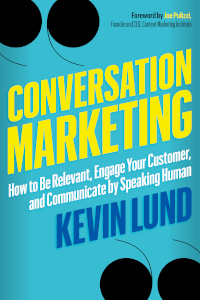
Conversation Marketing
Photos: Kevin Lund
Kevin Lund makes a living as a content marketer. He is convinced that while content marketing is not overly difficult it is a skill that needs to be developed. Believing he had know how to share with the world he spent a year conceptualizing, writing, editing and producing Conversation Marketing How to Be Relevant and Engage Your Customer by Speaking Human (Career Press, $16.95), a 230-page softcover book published in 2018.
“Any business, entrepreneur, marketing & communications professionals, content managers, and writers, who are interested in connecting with their own audiences, creating value for them, and ultimately monetizing that relationship,” he said by email via his publicist when asked about the target audience for the book.
“Companies and brands need to focus on eye-level conversation to create actionable content,” he said when asked about the term “speaking human” in the subtitle. “Speaking human implies using the same social mores that we employ in personal conversations with our peers – i.e. no jargon and having the ability to shape thoughts and inspire action through conversational story-telling.”
When asked: In this era of hacking, privacy concerns and identity theft how do you gain or regain your client’s trust? He said, “I’m not sure I have enough details to answer this question effectively. But broadly, there is a conversation happening around this subject that firms who are affected by this should be a part of. Educational articles to get in front of a potential problem are great ways to instill trust in an audience, particularly when they come from well-known brands.”
“All are effective with the right strategy,” he replied when asked: what are the most effect means and venues for communication, smartphones, tables, desktops, social media, email, online, print, broadcast? “It comes down to a smart channel strategy. The long sale process today can be through multiple touch points. Each of us have a unique preference for information gathering. Casting a wide net, but focusing on a majority of that strategy in the places where your audiences are hanging out the most is important.”
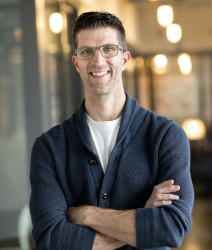
Kevin Lund, author, Conversation Marketing
“Email is still considered to be one of the most effective means for generating revenue and information-sharing for B2B and B2C firms,” he said when asked about the effectiveness of email marketing today. “Particularly when it comes to opt-in email campaigns. If a brand has a content strategy, using a blog or microsite, for example, using a lead-generation program that solicits signups for an email that is relevant to the person will have much higher open rates than unsolicited rates. The cost of creating information-based content in emails, like a newsletter or blog post, are nominal, and the ROI is very high.”
What is the best way to deal with market fragmentation? He said, “Fragmentation is a content marketer’s best friend! It’s all about relevancy, which is not the same thing as writing a couple of articles now and again that reach a smaller segment of your audience. It’s about creating multiple content strategies targeted to smaller groups of a larger audience. Go deep and niche. The more niche, the more”
So many companies talk, but don’t engage or respond, is that strategy advisable? His reply: “That’s a terrible idea. Complacency kills and content isn’t going away. Brands who don’t engage with content are putting themselves at a competitive disadvantage. Content marketing is about engagement using two-way conversation, not one-way conversations. If brands are just talking, nobody’s listening. There’s a right way and a wrong way to engage in conversation. Putting out trite content and hiding behind the language of “you” isn’t going to instill trust and win customers.”
The book is divided into three main parts titled Planning, Talking and Learning; and 10 chapters. Chapter titles are: Earn Attention, Tell A Story, Stay Humble, Pick Your Party, Be Relevant, Open Up and Listen, Start the Conversation, Known When to Stop Talking, Get Your Customer Involved and Ditch the Checklist. The author highlights Red Bull Media as “perhaps the world’s most successful content brand.” Lund is the founder and chief executive officer of T3Custom, a Seattle based content marketing agency.
Comments:
Filed Under: Books
Posted by Elena del Valle on January 21, 2019
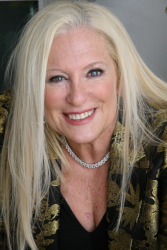
Linda Jane Smith, author, Lessons from The Meanest Woman Alive
Photo: Linda Jane Smith
A podcast interview with Linda Jane Smith, author, Lessons from The Meanest Woman Alive (see Lawyer shares advice with women on breaking glass ceiling) is available in the Podcast Section of Hispanic Marketing and Public Relations, HispanicMPR.com. During the podcast, she discusses how women can unleash their power with Elena del Valle, host of the HispanicMPR.com podcast.
Linda strives to strike fear into the heart of opposing counsel. According to her resume, she is one of the top five female litigators in the United States. She is teaching working women in varied fields to shine, lead and succeed, not by leaning in or out manning the men, but by using their unique feminine advantages to advance their careers.
To listen to the interview, scroll down until you see “Podcast” on the right hand side, then select “HMPR Linda Jane Smith” and click on the play button below or download the MP3 file to your iPod or MP3 player to listen on the go, in your car or at home from the RSS feed. Some software will not allow flash, which may be necessary for the play button and podcast player. If that is your case, you will need to download the file to play it. To download it, click on the arrow of the recording you wish to copy and save it to disk. The podcast will remain listed in the January 2019 section of the podcast archive.

Click to buy Smashing Glass & Kicking Ass
Posted by Elena del Valle on January 17, 2019

You Can Do All Things
Photos: Kate Allan
Has the New Year got you down? We all know someone who could use a pick me up. California artist Kate Allan does too. Many times drawing and being kind to herself helps her feel better. Her first book, You Can Do All Things (Mango, $22.99), is filled with 187 colorful drawings of animals and plants as well as words of encouragement for anyone suffering from anxiety and depression.
“I’m an artist and writer who has struggled with anxiety and depression for most of my life,” she said by email when asked about the book. “Both illnesses have set me back in a variety of ways; I learned to drive, had my first relationship, and got my degree later than my peers. So, I wanted to create a book of all the things I’ve learned along the way, everything that kept me going— whether it was calming myself through a small worry about not being good enough, to diffusing an intense preoccupation with suicide. The biggest lesson for me has been that self compassion and understanding will carry you through the worst of life, so most of the book’s messages are about validation, encouragement, and kindness.”
The 201-page hardcover book published in 2018 is made up mostly of color full page drawings in pages without page numbers, accompanied by short text. Examples of the inspirational messages include: “No one else knows what they’re doing either. It’s all going to turn out fine; No negativity today. You’re gettin’ work done! everything will work out, you’ll see.” In the conclusion she shares self help ideas such as creating something or de-cluttering.


Kate Allan drawings
“All of my book is written by someone who has been through the same struggles,” she said. “I argue my negative thoughts and turn those arguments into captions. Somehow it can feel more legitimate to hear something like, “you’re not failing, anxiety lies” coming from a sparkly purple cat rather than a person. Not sure why, but I’m rolling with it!
It’s all about challenging those insidious thoughts that bring us down, and I think that is the unfortunate commonality we share, no matter what gender or age.”
“I was a bit lucky that most of the book’s content had been created before my publisher Mango came along— I have always wanted to create a book of my writings and illustrations, and it was really just about waiting for the right opportunity,” she said regarding the publication timeline. “Mango contacted me in February 2018, and it was all put together by July.”
Regarding the artwork she said, “My process is that I sketch in pencil, looking at various reference photos online. Then I do the digital line work, coloring, and lettering in Paint Tool SAI and Photoshop.”
Her way of measuring success? “I just want the book to be helpful. I’ve created something that represents all the work I’ve done over the course of my life to succeed despite mental illness, and I hope that work will benefit others as well.”

Kate Allan, author, You Can Do All Things
Allan has been making a living as an artist for several years, partially through a shop where her artwork is sold, and partially through support by Patreon members. She is also the creator of the mental health art blog, The Latest Kate.

Click to buy You Can Do All Things
Comments:
Filed Under: Books
Posted by Elena del Valle on January 9, 2019
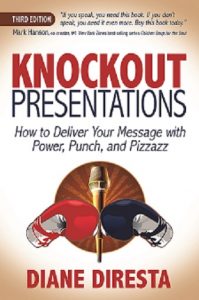
Knockout Presentations
Photo: Diane DiResta
Diane DiResta, chief executive officer, DiResta Communications, Inc., has dedicated her career to sales training and communications consulting. She coaches leaders on communications and public speaking who wish to gain business influence and impact. The third edition of her first book Knockout Presentations How to Deliver Your Message with Power, Punch and Pizzazz (Morgan James Publishing, $19.95) was published recently.
The 268-page softcover title has 10 chapters and an appendix of resources. She discusses issues such as myths, mistakes, nervousness, listening, presentation and persuasion skills, visual aids, setting the stage and dealing with difficult people. The third edition features new links, resources, and references representing about three percent of the book’s total content.
The target audience? “Business professionals,” she replied by email. “It has a wide breadth and has been read from the college campus to the C Suite. There are college professors who use it in their public speaking classes. It’s also the perfect book for sales teams as so many sales professionals give presentations. A professional speaker said Knockout Presentations helped her to write her keynote speech. The book has valuable tips and exercises for the novice to the seasoned speaker. Another professional speaker was given the book as a gift and thought she wouldn’t learn anything. But she was surprised that she gained some new tips even though she was an experienced speaker.”
“It took me 15 months to write it while working in my business,” she replied when asked about the book project duration. “It took a bit longer to publish. A traditional publisher can take up to 18 months to publish a finished manuscript.”
Regarding the book title and cover art she said, “The boxing glove is a visual for the title and a metaphor for giving a knockout presentation. It’s not a sports book but I did work with clients from the NBA, WNBA and USGA.”
When asked how she will measure success she replied, “Success is measured in two ways: sales and impact. Sales can be measured by the publisher. Impact comes from the many testimonials saying how it changed people’s lives.”
When asked: Many executives underestimate the value and effort required to be a good public speaker. What is the strongest financial argument you make to prove them wrong? she replied, “People who have good presentation skills have greater success in getting the job, getting promoted, making a sale, and making more money. Professors from Duke University, Fuqua School of Business studied voices of CEOs during investor earnings calls. They discovered that the CEOs with a deeper voice earned $187,000 more in pay and led companies with $440 million more in assets.
A CEO from a pharma company was able to convince the executive committee to fund the building of a $300 million facility with no guarantee of success. He was awarded the money and the initial investment yielded a 1 billion dollar profit. Public speaking is a soft skill that has a hard bottom line result.”

Click to buy Knockout Presentations
Comments:
Filed Under: Books
Posted by Elena del Valle on January 2, 2019

Best wishes for a healthy, happy and prosperous new year.
Posted by Elena del Valle on December 17, 2018

Tabitha Scott, CEO, Cole Scott Group
Photo: Cole Scott Group
A podcast interview with Tabitha Scott, CEO, Cole Scott Group is available in the Podcast Section of Hispanic Marketing and Public Relations, HispanicMPR.com. During the podcast, she discusses year end mania, the perfect time to recharge with Elena del Valle, host of the HispanicMPR.com podcast.
Tabitha is a certified energy manager CEM, and certified demand side manager CDSM and completed four levels of human biofield accreditations. She was formerly chief executive officer of Military Assistance Company. She served as senior vice president of Innovation & Sustainability at Balfour Beatty Investments and Lend Lease Americas. Tabitha is an advisor and speaker on energy, change management and innovation, with several published works.
To listen to the interview, scroll down until you see “Podcast” on the right hand side, then select “HMPR Tabitha Scott” and click on the play button below or download the MP3 file to your iPod or MP3 player to listen on the go, in your car or at home from the RSS feed. Some software will not allow flash, which may be necessary for the play button and podcast player. If that is your case, you will need to download the file to play it. To download it, click on the arrow of the recording you wish to copy and save it to disk. The podcast will remain listed in the December 2018 section of the podcast archive.
Posted by Elena del Valle on December 6, 2018
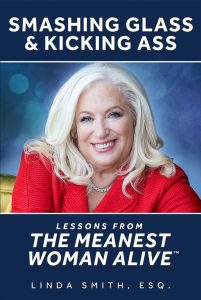
Smashing Glass & Kicking Ass
Photo: Smith Publicity, Linda Jane Smith
According to her bio, Linda Jane Smith has found much success as a lawyer; and she has defended Exxon in an Alaska environmental lawsuit among other high profile cases. She believes she knows the path to the top and wants to share it with women. She dedicated time during one year to gathering her thoughts in Smashing Glass & Kicking Ass: Lessons from the Meanest Woman Alive ($19.97), a 245-page softcover book published this year.
It seems she believes those women who have not risen through the ranks the way she has are attempting to advance the wrong way because they are competing according to the rules of the male playbook; if they try harder, stop underestimating themselves and apologizing and start playing by a new set of rules they might become successful like her.
When asked by email via her publicist what inspired her to write the book she replied, “I am outraged that talented, fantastic women are still not making it to the top.Despite decades of superficial change in the ranks of business, today’s women are stalled in their quest to advance their careers. Across every level of work, in every industry, women still struggle to earn the same level of pay, to receive equal access to opportunity and promotion, and to do the work they were hired to do without fear of harassment or the discrimination of pervasive gender bias.”
Regarding the target audience for her book she said, “Despite graduating from college and professional schools and entering the workforce in equal numbers with men, females fail to make the same progress in their jobs as their male counterparts do, and that phenomenon repeats itself throughout the leadership pipeline. The number of women shrinks by about half at the middle-management level and dwindles to a fragment when it comes to promotion to the C-suite.
I thought my target audience would be college or grad school women in their mid-20s. ‘Here’s everything you need to know to succeed as a woman in business.’ But women tell me it takes a few years before they feel the brunt of gender discrimination. These women, in their late- twenties, early thirties and older, are looking to take their careers to the next level and are stuck, getting pushed out, settling for positions for which they are overqualified, or burning out along the way.”
When asked what makes her the Meanest Woman Alive she replied, “I am one of the top women litigators in the United States. Corporate Board Member Magazine did a profile on me in 2001 and entitled it ‘The Meanest Woman Alive.’ Clients love it. When I’m representing them on gigantic cases with billions of dollars and their company are at stake, they love to say they are represented by the Meanest Woman Alive and my law firm.
I view myself as a gladiator for my client—I protect them and defend them. And I am professional and fun to deal with. It’s only when they are attacked or someone lies or misrepresents the facts or the law, that I become mean. If anyone messes with my clients and doesn’t have integrity, I will go after them hammer and tong.”
How will she measure the success of her book? “Based on the number of women I inspire to unleash their unique feminine advantages. My Facebook website has a half million Followers whose comments uplift me as do women’s responses to the 11 tv shows, 25 plus podcast and innumerable articles and blogs I have written,” she said.

Click to buy Smashing Glass & Kicking Ass
Comments:
Filed Under: Books

























